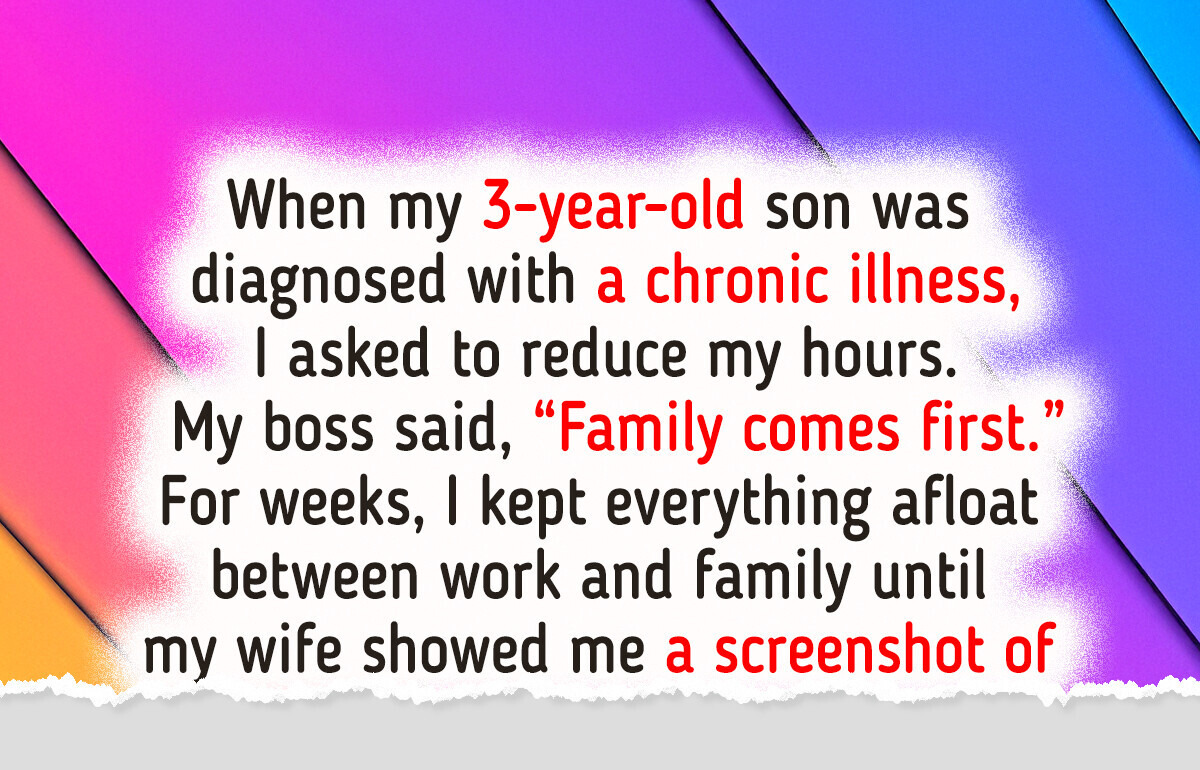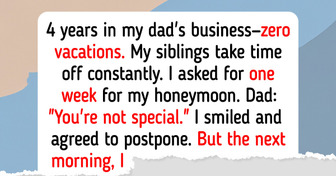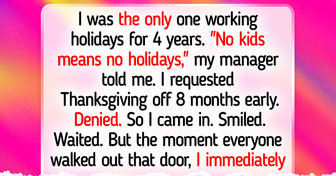I think, I can never earn over which I paid by my precedent employer, but I was wrong, world is so large to try their fate. but now I am making $52/h even more,and easily earn minimum $1300/week, on the experience everyone must try to do work online, easy way to earn, here's an example.
𝐰𝐰𝐰.Richnow1
I Thought My Boss Would Support Me Through My Son’s Illness—The Truth Hit Me Hard

Each individual has their priorities, and it is common for parents to prioritize their family first. People work to treat themselves, to save up for their plans, or to support their family. In our Bright Side reader’s case, he was doing his best both at work and with his family. All was well until a workplace betrayal happened.
While feeling conflicted, he shared his situation.

“I work at my dream company, which I prepared so much for getting in during the hiring process. Fortunately, I got the position that I wanted, which support my family because the pay is good. I have a decent superior and good colleagues.
When my 3-year-old son was diagnosed with a chronic illness, I was at a loss. I asked to reduce my hours because I have to be with my son at the hospital. My boss said, ‘Family comes first. We’ve got your back.’ With a sigh of relief, I believed him.
For weeks, I worked late, took calls from hospital corridors, and answered emails half-awake. I compensated for the reduced working hours with my effort and hard work. Although it was exhausting to juggle it all in one place, a hospital at that, I endured and was managing it okay.”
“I kept everything afloat between work and family until my wife showed me a screenshot of a coworker’s post on LinkedIn. My boss uploaded our team photo, and someone commented, ‘Where’s Peter?’ And he—the same man who promised to support me—replied, ‘He’s stepped away. We’re already filling the gap.’ I felt sick.
I was giving my best at this job, even if I’m currently in an unstable situation. I thought that my boss had my back. I was blindsided by this decision.
Later that night, I checked the internal job board to see if the screenshot made sense. They were hiring for my position while I was still in it. I didn’t get any information about it. I’m still showing up, still smiling through it. But every minute, it feels like they’re just waiting for me to quit. What should I do in this situation?”
Our reader is in a tough situation, and it is highly appreciated that he shared it with us. Given what’s happened, it’s completely understandable to feel blindsided and unsure of your next steps. Here are some thoughtful, balanced actions to consider:
Stay calm and document everything.
Before making any assumptions, take a step back and look at the situation objectively. Try to confirm what the job posting means. It could be a misunderstanding, a contingency plan, or something more serious. Approach this with curiosity rather than confrontation for now.
Keep a record of all communications with your boss—emails, messages, even notes from verbal conversations. Save the LinkedIn screenshot and check for anything else signaling replacement plans. If things get worse or turn legal, this will help you.
Get clarity by requesting a private communication.
Before confronting anyone, try to confirm the hiring post through HR or a trusted colleague. Once you’ve gathered your facts and emotions, you may request a private meeting with your boss. Ask directly and calmly for a job listing that matches your role. Keep the tone respectful and open. This invites transparency without escalating tension.
This will help you get the clarity regarding your situation and the truth about what’s happening in your position within the company.
Update your resume and network.
Begin quietly preparing for all possibilities. Start by updating your resume and LinkedIn profile to reflect the value you’ve brought to your current role, even in the face of personal hardship. Reach out to trusted contacts in your professional network to rekindle connections and stay visible.
You deserve to feel secure, and part of that security comes from knowing you have options. When the ground feels shaky, taking proactive steps like these can restore a sense of control. It’s about creating a safety net so that no matter what unfolds, you’re not caught off guard again.
Take care of yourself.
You’re handling an incredibly difficult situation, balancing work and your son’s health. It’s important to protect your mental and emotional well-being during this time. If your current job feels uncertain or unsupported, pay attention to how it’s affecting you.
Exploring other opportunities doesn’t mean you’re giving up—it means you’re valuing stability, respect, and a future that works for both your family and your career. You deserve a workplace that sees your effort and stands by its promises.
Explore Legal Options (if necessary).
If your situation starts to feel unfair or if you’re being forced out after asking for a reasonable adjustment to care for your child, it’s okay to ask questions. Depending on where you live, there may be laws that protect your rights as a working parent. You don’t have to go through this alone or guess what’s allowed.
If things continue to feel off, consider quietly reaching out to HR or a legal advisor to better understand your options. Knowing your rights can bring peace of mind and help you make informed decisions, whether you stay or need to consider something new.
For more workplace stories, click this link.
Comments
Related Reads
15+ Stories That Prove Luxury Can Be Misleading

12 Life Twists That Feel Like a Rollercoaster With No Seatbelt

I Refuse to Let My Stepmom Erase My Mom’s Memory, So I Chose Revenge

15 Moving Stories That Show Rocky Ride and Love Of Blended Families

I Won’t Accept Unequal Treatment in the Family Business

13 People Share the Things They’ve Been Hiding From Their Partners for Years

My MIL Mocked Me at My Husband’s Birthday Party—I Gave Her a Brutal Reality Check

13 Stories Proving That Female Solidarity Turns Ordinary Women Into Legends

I’m Not Delaying My Retirement for My Sick Daughter — I’m Done Being Her Cash Cow

15 Stories That Show Kindness Is the Quiet Power the World Often Forgets

I Refused to Work Holidays Just Because I’m Childfree

18 Stories That Prove a Cleaner’s Job Is About More Than Just Dusting






